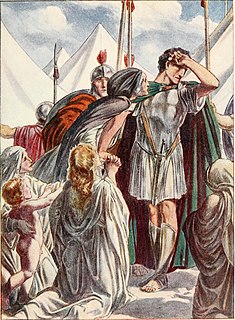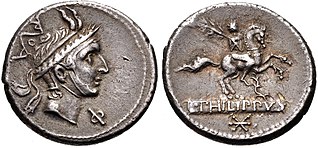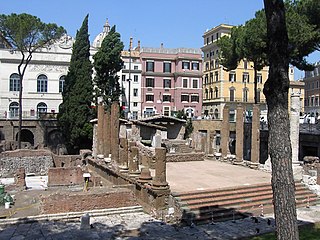Related Research Articles

The gens Valeria was a patrician family at ancient Rome, prominent from the very beginning of the Republic to the latest period of the Empire. Publius Valerius Poplicola was one of the consuls in 509 BC, the year that saw the overthrow of the Tarquins, and the members of his family were among the most celebrated statesmen and generals at the beginning of the Republic. Over the next ten centuries, few gentes produced as many distinguished men, and at every period the name of Valerius was constantly to be found in the lists of annual magistrates, and held in the highest honour. Several of the emperors claimed descent from the Valerii, whose name they bore as part of their official nomenclature.
The gens Tullia was a family at ancient Rome, with both patrician and plebeian branches. The first of this gens to obtain the consulship was Manius Tullius Longus in 500 BC, but the most illustrious of the family was Marcus Tullius Cicero, the statesman, orator, and scholar of the first century BC. The earliest of the Tullii who appear in history were patrician, but all of the Tullii mentioned in later times were plebeian, and some of them were descended from freedmen. The English form Tully, often found in older works, especially in reference to Cicero, is now considered antiquated.

The gens Aurelia was a plebeian family at ancient Rome, which flourished from the third century BC to the latest period of the Empire. The first of the Aurelian gens to obtain the consulship was Gaius Aurelius Cotta in 252 BC. From then to the end of the Republic, the Aurelii supplied many distinguished statesmen, before entering a period of relative obscurity under the early emperors. In the latter part of the first century, a family of the Aurelii rose to prominence, obtaining patrician status, and eventually the throne itself. A series of emperors belonged to this family, through birth or adoption, including Marcus Aurelius and the members of the Severan dynasty.
Lucius Licinius Crassus was a Roman orator and statesman. He was considered the greatest orator of his day, most notably by his pupil Cicero. Crassus is also famous as one of the main characters in Cicero's work De Oratore, a dramatic dialogue on the art of oratory set just before Crassus' death in 91 BC.
Lucius Aelius Stilo Praeconinus, of Lanuvium, was the earliest known philologist of the Roman Republic. He came from a distinguished family and belonged to the equestrian order.

The gens Pompeia was a plebeian family at ancient Rome, first appearing in history during the second century BC, and frequently occupying the highest offices of the Roman state from then until imperial times. The first of the Pompeii to obtain the consulship was Quintus Pompeius in 141 BC, but by far the most illustrious of the gens was Gnaeus Pompeius, surnamed Magnus, a distinguished general under the dictator Sulla, who became a member of the First Triumvirate, together with Caesar and Crassus. After the death of Crassus, the rivalry between Caesar and Pompeius led to the Civil War, one of the defining events of the final years of the Roman Republic.
Annalists, were a class of writers on Roman history, the period of whose literary activity lasted from the time of the Second Punic War to that of Sulla. They wrote the history of Rome from the earliest times down to their own days, the events of which were treated in much greater detail. Annalists were different from historians, in that an annalist was more likely to just record events for reference purposes, rather than offering their own opinions of events. There is, however, some overlap between the two categories and sometimes annalist is used to refer to both styles of writing from the Roman era.

The gens Marcia, occasionally written Martia, was one of the oldest and noblest houses at ancient Rome. They claimed descent from the second and fourth Roman Kings, and the first of the Marcii appearing in the history of the Republic would seem to have been patrician; but all of the families of the Marcii known in the later Republic were plebeian. The first to obtain the consulship was Gaius Marcius Rutilus in 357 BC, only a few years after the passage of the lex Licinia Sextia opened this office to the plebeians.

Lucius Marcius Philippus was a Roman orator and an important politician of the late Roman Republic.
Marcus Porcius Cato Licinianus was son of Cato the Censor by his first wife Licinia, and thence called Licinianus, to distinguish him from his half-brother, Marcus Porcius Cato Salonianus, the son of Salonia. He was distinguished as a jurist.

The gens Lutatia, occasionally written Luctatia, was a plebeian family of ancient Rome. The first of the gens to obtain the consulship was Gaius Lutatius Catulus in 242 BC, the final year of the First Punic War. Orosius mentions their burial place, the sepulchrum Lutatiorum, which lay beyond the Tiber.
The gens Terentia was a plebeian family at ancient Rome. Dionysius mentions a Gaius Terentilius Arsa, tribune of the plebs in 462 BC, but Livy calls him Terentilius, and from inscriptions this would seem to be a separate gens. No other Terentii appear in history until the time of the Second Punic War. Gaius Terentius Varro, one of the Roman commanders at the Battle of Cannae in 216 BC, was the first to hold the consulship. Members of this family are found as late as the third century AD.

The gens Postumia was a noble patrician family at ancient Rome. Throughout the history of the Republic, the Postumii frequently occupied the chief magistracies of the Roman state, beginning with Publius Postumius Tubertus, consul in 505 BC, the fifth year of the Republic. Although like much of the old Roman aristocracy, the Postumii faded for a time into obscurity under the Empire, individuals bearing the name of Postumius again filled a number of important offices from the second century AD to the end of the Western Empire.

The gens Annia was a plebeian family at ancient Rome. Livy mentions a Lucius Annius, praetor of the Roman colony of Setia, in 340 BC, and other Annii are mentioned at Rome during this period. Members of this gens held various positions of authority from the time of the Second Punic War, and Titus Annius Luscus attained the consulship in 153 BC. In the second century AD, the Annii gained the Empire itself; Marcus Aurelius was descended from this family.
The gens Fannia was a plebeian family at ancient Rome, which first appears in history during the second century BC. The first member of this gens to attain the consulship was Gaius Fannius Strabo, in 161 BC.

The gens Coelia, occasionally written Coilia, was a plebeian family at ancient Rome. The Coelii are frequently confounded with the Caelii, with some individuals called Caelius in manuscripts, while they appear as Coelius or Coilius on coins. The first of this gens who obtained the consulship was Gaius Coelius Caldus in 94 BC.
The gens Gratidia was a plebeian family at ancient Rome. Originally coming from Arpinum, members of this gens are known from the final century of the Republic.

The gens Herennia was a plebeian family at ancient Rome. Members of this gens are first mentioned among the Italian nobility during the Samnite Wars, and they appear in the Roman consular list beginning in 93 BC. In Imperial times they held a number of provincial offices and military commands. The empress Herennia Etruscilla was a descendant of this gens.
Livia Drusa was a Roman matron. She was the daughter of Marcus Livius Drusus, consul in 112 BC, and sister of Marcus Livius Drusus, tribune of the plebs in 91 BC. She was the mother of Cato the Younger, and grandmother of Marcus Junius Brutus, through her oldest daughter Servilia.
References
 This article incorporates text from a publication now in the public domain : Smith, William, ed. (1870). "Antipater, L. Coelius". Dictionary of Greek and Roman Biography and Mythology . Vol. 1. p. 202.
This article incorporates text from a publication now in the public domain : Smith, William, ed. (1870). "Antipater, L. Coelius". Dictionary of Greek and Roman Biography and Mythology . Vol. 1. p. 202.